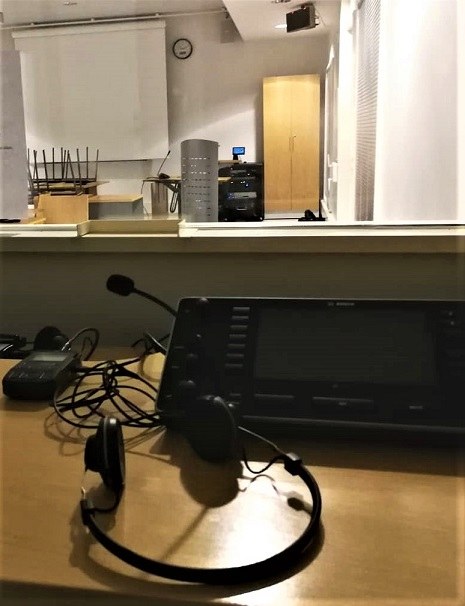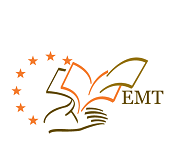
Multilingual communication and translation studies
The Master’s Programme in Multilingual Communication and Translation Studies, also known as Moviko, trains versatile communication experts who are broadly equipped for both domestic and international job positions, and have a firm foundation for academic postgraduate studies. In addition to being translators and interpreters, our graduates also work in, for example, the central government, EU institutions, and in various international commerce and communication positions in the private sector. Many go on to start their own language service company, and the programme also provides skills for working as a freelancer.
In Moviko, you can study translation and interpreting in the following language pairs: Finnish–English, Finnish–Swedish, Finnish–German, and Finnish–Russian. Many of our courses are common to all language pairs, thus providing excellent opportunities for networking during your studies.
Being an expert in multilingual communication includes much more than translating and interpreting. It also covers areas such as specialised subject fields, text types and discourse, ethics, strategy, presenting skills, project management and entrepreneurship.
The task of an expert in multilingual communication is, above all, to make the world easier to understand for all of us. This is not limited to just overcoming language barriers, but also includes promoting clear and user-centered communication in general. In Moviko, we acknowledge the importance of accessibility, which is reflected in research as well as in the way studies are structured and conducted.
Translation studies is a multidisciplinary, dynamic field that opens fascinating and even unexpected possibilities in multiple directions. In Moviko, we conduct innovative research that spans a wide spectrum of topics from comics to legal texts and from machine translation to ethics in interpreting.
Interaction between research and teaching
Teaching in the Master's Programme in Multilingual Communication and Translation Studies is based on research, and our teaching and research are in close interaction with one another. We study what we teach. We teach editing, interpreting, specialised translation, translation in creative industries, translation technology, and working life skills. The focal points of our research are:
- multimodality research
- accessible communication research
- sociology of translation and interpreting (the people, practices and environments in the translation industry; multilingualism)
- research into specialised translation and interpreting, including terminology
- research into translation technology, corpus-based translation research
The close interrelation between teaching and research is also reflected in our research activity. Several doctors of translation studies have graduated from Tampere University, most recently Mary Nurminen (2021), Julia Souma, Jenni Laaksonen (2023), Annamari Korhonen, Anu Heino (2024) and Riku Haapaniemi.
Research groups and projects
Eliisa Pitkäsalo, Sarjis group: Promoting Linguistic Justice with Social Welfare Comics. Academy of Finland (2025–2026)
Maija Hirvonen & project partners: NewWorkTech. Horizon Europe (2024–2027)
Mattia Thibault & InterReality research group: InterReal – A Systematic Exploration of Interreal Translations in the Media Multiverse research project (2025–2029). European Research Council Starting Grant
Multimodality in translation and interpreting (MULTI)
Mikhail Mikhailov & team: Corpus-based Studies of Specialised Texts, Translations and Terminology (COSSTT). Members of the research group: Marja Kivilehto, Igor Kudashev, Arja Nurmi, Henrik Oksanen, Miia Santalahti, Julia Souma and Anu Viljanmaa.
More information on our research teams and projects at the Multidisciplinary Research Centre for Languages and Cultures (Plural) site.
Other research
Authorised translation
The study of authorised translation has a long tradition at Tampere University. One of the pioneers of the field, Kaarina Hietanen, published her dissertation in 2005 and revolutionised both the Authorised Translator’s Examination and the work of authorised translators. Currently, research into authorised translation is carried out by Marja Kivilehto, who has investigated the Authorised Translator’s Examination both in terms of the assignments included in the examination and its assessment.
The didactics of translation
In her dissertation, Dinah Krenzler-Behm (2013) has studied ways of integrating authentic commissions into translator education. The purpose of the study was to clarify the special characteristics of authentic commissions in the context of teaching. The goal was to create a flexible yet robust didactic model, which would allow the production of well-functioning translations which meet the brief and satisfy the client, regardless of working languages or genres.
Teaching at Moviko
The versatile translation and interpreting research activity of Moviko teachers is strongly reflected in our teaching – we teach what we study. Our teaching focuses on topics, knowledge and skills relevant for the field of multilingual communication and its development. The degree programme interacts with professionals of translation and communication, and we enjoy the full benefits of their expertise in our teaching.
Translation teaching
Moviko offers versatile opportunities for studying translation: the topics of translation exercises cover a wide range of genres from poetry to treaties concerning nuclear energy. The exercises are carried out by using specialised translation software, such as translation memory programmes, term databases and corpora.
Moviko students have the opportunity to pass the Authorised Translator’s Examination as part of their studies.
Interpreting teaching
Moviko offers students the opportunity to learn about different areas of interpreting: consecutive, community and simultaneous interpreting, as well as interpreting research. Expert teachers and the faculty’s own state-of-the-art interpreting studio enable versatile practice and in-depth understanding of the field of interpreting.
We also offer a separate module on legal interpreting. Tampere University’s Master's Programme in Multilingual Communication and Translation Studies fulfils the requirements of the government decree on inclusion in the national Register of Legal Interpreters. For more information (in Finnish), see https://www.oph.fi/fi/palvelut/oikeustulkkirekisteri.

Working-life oriented teaching
Our practice-oriented teaching aims to offer students as comprehensive an understanding of the professional field and is practices as possible. Because many translation industry professionals find employment as freelancers or entrepreneurs, our teaching also takes into account self-employment skills.
Moviko studies contain many multilingual and multisectoral projects, which provide students with excellent opportunities for networking and useful contacts already during their studies. In addition, students can include independent projects and work practice in their degree.
Examples of teaching projects:
Helsinki Art & Plow
In the fall of 2023, students translated poems from Russian to Finnish in a poetry workshop. The poems were written by Alexander Delfinov, and the poet himself presented them at the Helsinki Art & Plow festival's stage poetry evening on November 18, 2023, in Helsinki.
Theatre subtitling
In 2020–2021, students created intralinguistic subtitles for the main production of the Tampere Theatre in the spring season 2021, Saatana saapuu Moskovaan (The Master and Margarita). The students also timed the subtitles in real time during all 17 performances.
Handbook of Translation Studies
In a project course held in 2020–2021, students translated chapters in the Handbook of Translation Studies Online (John Benjamins). The translations were created in close collaboration with the Finnish translation studies community, and they thus strengthen the position of Finnish as a language of research in this field.
Elämää sinnittelevässä pikkukaupungissa (Life in a struggling small town)
In spring 2020, as part of an editing course, students carried out large-scale language revision for a recently published volume called Elämää sinnittelevässä pikkukaupungissa: varkautelaisten arki ja hyvinvointi. More on the project in the intranet news item.
Alusta! online publication
In a project course held in 2019–2020, students collaborated with the Alusta! online journal published by the Tampere University Faculty of Social Sciences. The students translated articles on social sciences intended for wide audiences, mostly from Finnish into English. The topics of the articles dealt with current societal topics, such as climate policies, elderly care, and wellbeing at work.
Kärpänen mustepullossa (A fly in an inkwell)
Kärpänen mustepullossa (A fly in an inkwell) is the final part of a Finnish trilogy published by LiteraruS, a publisher mostly focussing on Russian literature. The volume has stories, novellas and other short prose written by Russian-language authors living in Finland and elsewhere in Europe. Most of the texts were translated by Tampere University translation students as either part of a course or independently. Student translations have also been published in the Finnish volumes of the LiteraruS online journal.
Some Moviko collaboration partners
EMT

Moviko is one of the founding members of the EMT (European Master’s in Translation) network, and a member since 2009. EMT is an international quality network operating with the support of EU’s DGT (Directorate-General in Translation). At the moment, 81 masters programmes all over Europe are members of the network. EMT is designed to ensure the high quality of translator education and to organise co-operation between network members.
In January 2020, Moviko organised the Translating Europe event. Representatives of the DGT visit Tampere University regularly.
ID-TS
Moviko is a member of the Doctoral Programme of Language Studies at the Faculty of Information Technology and Communication Studies. The doctoral programme is a member of the International Doctorate in Translation Studies, (ID-TS) network. Moviko’s Kaisa Koskinen is the secretary of the network.
DOTTSS
Moviko is included in the international DOTTSS Doctoral and Teacher Training Translation Studies Summer School. The DOTTSS network includes five universities. In addition to Tampere University, the members are University of Turku, the University of Ljubljana (Slovenia), University of Granada (Spain) and Boğaziçi University (Turkey). The network organises yearly summer schools for doctoral students, arranged in alternate years in Spain, Slovenia and Finland.
SKTL (Finnish Association of Translators and Interpreters)
Moviko collaborates in many ways with the Finnish Association of Translators and Interpreters (SKTL). Moviko representatives participate in the V Section (educators and researchers) of the association, as well as the local Tampere Section. Moviko takes its turn in organising the annual KäTu Symposium on Translation and Interpreting Studies. Sari Hokkanen represents Tampere university in the editorial team of the open access Mikael publication of SKTL, and Moviko teachers and researchers publish their studies in the journal actively.
SDL

Tampere University is an SDL partner university and the only Finnish university to be a member of the SDL Academic Partner Programme. The SDL Trados Studio translation memory software is widely used in our translation courses.
WordFast

Our curriculum includes a practice of Wordfast translation tools, courtesy of Wordfast LLC and Yves Champollion





